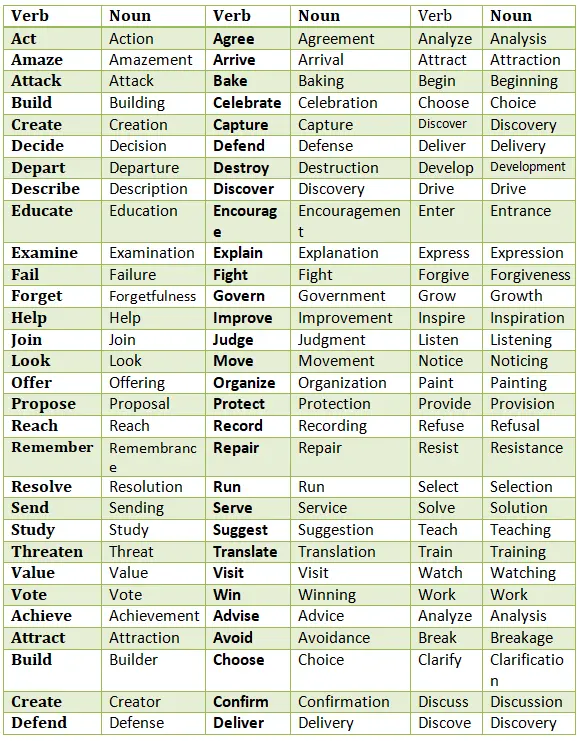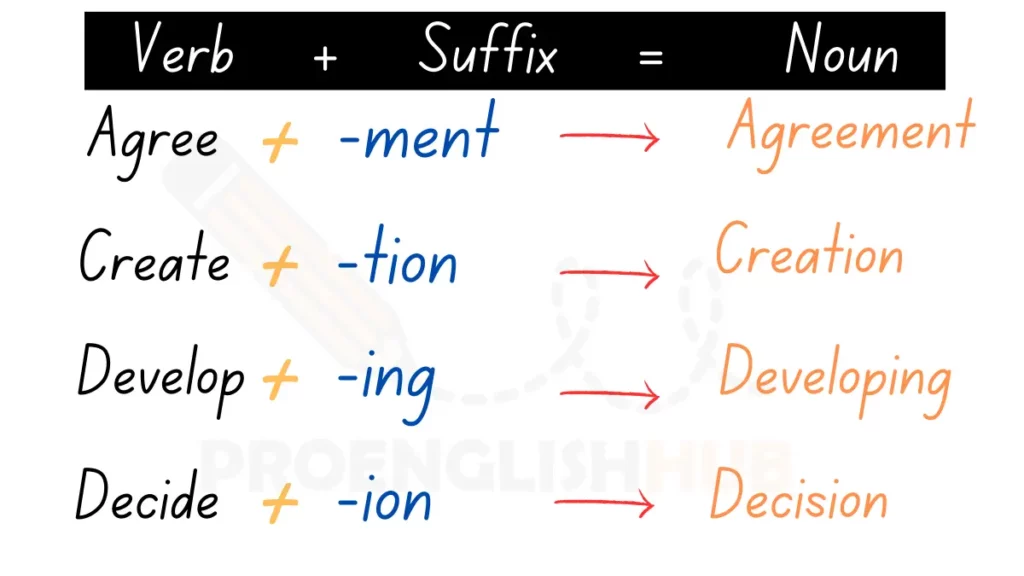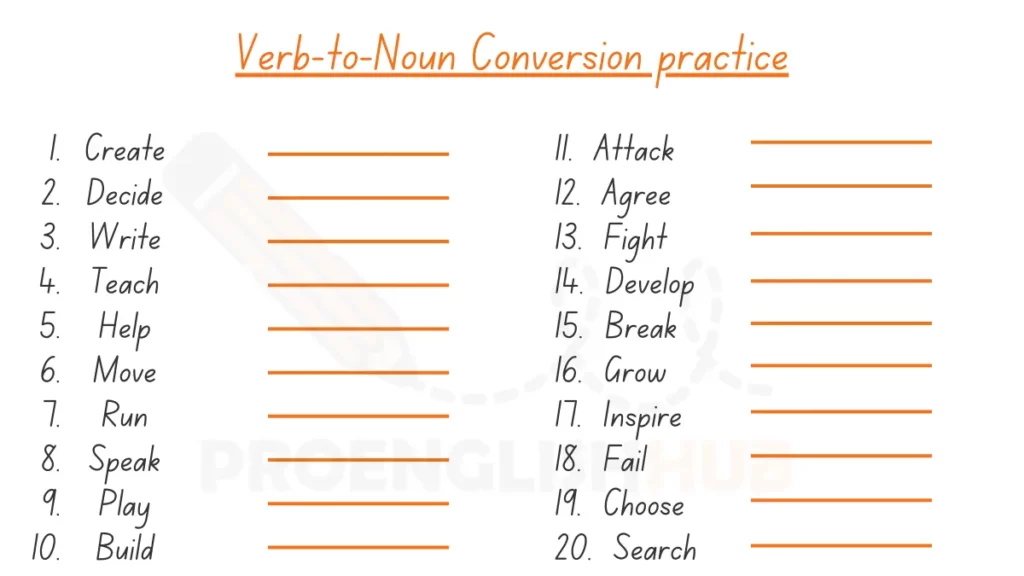To make nouns from verbs in English, you can add specific suffixes like -tion, -ment, or -ing, or use the base form of the verb itself. For example, “decide” becomes “decision,” “achieve” becomes “achievement,” and “run” becomes “running.” Some verbs even have unique noun forms, such as “speak” turning into “speech.” By learning common patterns, you can easily identify and form nouns from verbs in everyday writing and speaking.
A verb is an action word, like run, write, or read.
A noun is a person, place, thing, or idea, like runner, writer, or reading.
To turn a verb into a noun, you follow specific patterns. These rules make English easier to understand and use.

Why Do We Need to Convert Verbs into Nouns?
Nouns describe people, activities, or things related to actions.
For example:
- Verb: Teach
- Noun: Teaching
This lets you talk about the action itself instead of performing it.
How Can You Make a Noun from a Verb?
Here are some common methods you can use to make noun from a verb:
1. Add Suffixes
The most common way to form nouns is by adding a suffix to the verb. Here are some examples:
| Verb | Suffix | Noun |
| Act | -ion | Action |
| Decide | -sion | Decision |
| Create | -tion | Creation |
| Manage | -ment | Management |

How Do Suffixes Work?
Suffixes like -ion, -ment, and -ing change the meaning of a verb into something you can name.
For example:
- Act becomes action (the thing you do).
- Manage becomes management (the process of handling something).
2. Use the Base Word as a Noun
Some verbs work as nouns without any changes. These are called zero-change words.
Examples:
- Verb: Dance
- Noun: Dance
The meaning changes based on the sentence:
- I dance every day. (verb)
- The dance was amazing. (noun)
3. Use Gerunds (Add -ing)
Adding -ing to a verb creates a gerund, which acts as a noun.
Examples:
- Verb: Run → Noun: Running
- Verb: Read → Noun: Reading
You can use gerunds to describe activities:
- Running is fun.
- Reading helps you learn.
4. Change Spelling Slightly
Some verbs need slight spelling changes when forming nouns.
Examples:
- Advise → Advice
- Choose → Choice
These changes depend on English rules and may need memorization.
5. Use a Different Word
English has irregular verb-to-noun conversions where the noun is entirely different.
Examples:
- Verb: Speak → Noun: Speech
- Verb: Think → Noun: Thought
Are There Exceptions?
Yes, English has exceptions. Some verbs don’t follow the rules. For example:
- Go → Journey
- Be → Existence
These exceptions are less common but important to learn.
How Can You Practice Verb-to-Noun Conversion?
Here’s how you can Practice Verb-to-Noun Conversion:
- Write Sentences:
Take a verb and make sentences using its noun form.
Example:- Verb: Decide → Sentence: Her decision was final.
- Read English Stories:
Look for verbs and their noun forms.
Example:- He sings every day. → His singing is wonderful.
- Use Online Tools:
Websites like Grammarly and Thesaurus.com can help identify word forms.

What Are Some Common Verbs and Their Noun Forms?
Here is a list for reference:
| Verb | Noun |
| Teach | Teaching |
| Move | Movement |
| Argue | Argument |
| Describe | Description |
| Develop | Development |
Exercises for Practicing Verb-to-Noun Conversion
Here are some exercises to help you practice turning verbs into nouns. These activities will test your understanding and make the learning process fun!
Exercise 1: Fill in the Blanks with the Correct Noun Form
Convert the given verbs into nouns and complete the sentences.
- He made a big ________ (decide) about his career.
- The artist’s ________ (create) amazed everyone.
- ________ (argue) is not a good way to solve problems.
- Her ________ (achieve) in science is remarkable.
- We should focus on the ________ (develop) of new skills.
Exercise 2: Match the Verb to Its Noun
Draw a line to match each verb with its correct noun form.
| Verb | Noun |
| Act | Development |
| Manage | Action |
| Decide | Management |
| Develop | Decision |
| Argue | Argument |
Exercise 3: Identify the Noun Forms in a Sentence
Read the sentences and underline the noun forms derived from verbs.
- Her singing was beautiful.
- The management made a quick decision.
- Writing every day improves your skills.
- His speech impressed the audience.
- There is no argument against the rules.
Exercise 4: Rewrite Sentences Using Nouns
Rewrite the sentences by replacing the verb with its noun form.
- She teaches math.
→ Her ________ is in math. - He argues with his friends.
→ Their ________ never ends. - They moved to a new city.
→ The ________ was exciting for them. - I describe the painting.
→ My ________ of the painting is detailed. - He decides quickly.
→ His ________ is always fast.
Exercise 5: Create Your Own Sentences
Write one sentence using each noun form:
- Action
- Decision
- Management
- Creation
- Argument
Answer Key
Exercise 1:
- Decision
- Creation
- Argument
- Achievement
- Development
Exercise 2:
- Act → Action
- Manage → Management
- Decide → Decision
- Develop → Development
- Argue → Argument
Exercise 3:
- Singing
- Management, decision
- Writing
- Speech
- Argument
Exercise 4:
- Her teaching is in math.
- Their argument never ends.
- The move was exciting for them.
- My description of the painting is detailed.
- His decision is always fast.


